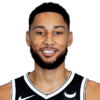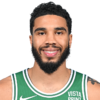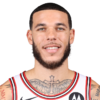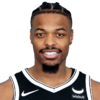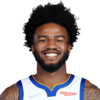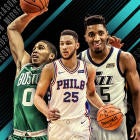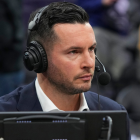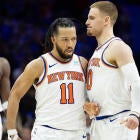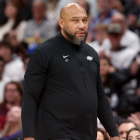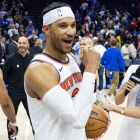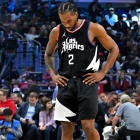Can you believe we're almost halfway done with the NBA season?
It sure has zoomed by, and we thought now would be a good time to step back and take a break from our normal NBA Rookie Power Rankings to look at things through the lens of every first-year player's most coveted honor: The NBA Rookie of the Year award.
For the first two months of the season it looked like 76ers point guard Ben Simmons would run away with it, but then Donovan Mitchell and Kyle Kuzma turned into scoring machines while Jayson Tatum continued his remarkably consistent play for a championship contender.
While those three continued their strong play, Simmons went into a bit of a mini-slump, which has resulted in a Rookie of the Year race much closer than originally anticipated. While it's likely a four-man race, we've included the full list of 10 to give credit to those youngsters who have made this one of the deepest rookie classes we've seen in quite some time.
| 1 |
Ben Simmons
Philadelphia 76ers PG
|
Stats: 16.9 points, 8.5 rebounds, 7.4 assists, 1.9 steals, 0.9 blocks The good: Simmons steamrolled his way into the NBA as a 6-foot-10 point guard freight train, and the league clearly had no idea what to do with him early on. His ball-handling ability and vision, thanks to his height, make him lethal in transition -- per Synergy, he's among the NBA leaders (not just rookies) in scoring or assisting in transition opportunities. He's also emerging as a rim protector, averaging nearly a blocked shot per game, and the Sixers' defensive rating has been markedly better with him on the court because of his versatility.Needs improvement: It's no secret that Simmons' jump shot, or lack thereof, is his biggest point of concern. He's made the decision to play to his strengths, only attempting four real shots beyond 17 feet all season per Synergy (his eight 3-point attempts are all end-of-quarter heaves). On one hand it's led to tremendous efficiency -- Simmons is shooting 50 percent from the field -- but on the other hand it's allowed defenses to completely disregard him as a shooter, leading to Simmons' mini-slump over the last month. It's gotten to the point where teams are daring him to take wide-open 10-to-15-footers, which has clearly gotten into the 21-year-old's head and led to some pretty awful bricks. This lack of shooting tends to make the Sixers sluggish offensively, particularly when Joel Embiid is off the court. Bottom line: Despite his recent relative struggles, the Rookie of the Year award is still Simmons' to lose. If he can power his way through the wall, he could end up going down as one of the best rookies we've seen in recent history. If he's unable to make the necessary adjustments, however, he's going to have some serious pressure from a strong rookie class. | |
| 2 |
Donovan Mitchell
Utah Jazz SG
|
Stats: 18.3 points, 3.4 assists, 3.2 rebounds, 1.5 steals The good: It's safe to say that Mitchell has been the most dynamic scorer in this rookie class, and the Nuggets have to be kicking themselves that they traded the No. 13 pick to the Jazz (unless Tyler Lydon's just a late bloomer). He's shown the ability to score at all three levels (shooting 35 percent on 3-pointers) and his freakish athleticism around the rim is obvious, but most impressive has been Mitchell's decision-making ability as a pick-and-roll ball-handler -- something that doesn't always come quickly for young players. Watch as he stays patient and keeps his dribble alive as he waits for the play to unfold, then knocks down an easy, wide-open mid-range jumper. Mitchell's quickness and wingspan also have him second among rookies in steals, just behind Simmons. Needs improvement: Mitchell's efficiency needs to get better, though it's not entirely his fault. He's shooting 44 percent from the field, but that's largely due to how much Utah relies on him offensively. His usage rate of 28.2 percent is second only to Dennis Smith Jr. among rookies, so with such high demands you'd expect Mitchell to struggle at times. He's had plenty of 6-for-18 or 4-for-17-type performances this season, which will likely become less frequent as he continues to evolve his game and the Jazz (hopefully) get healthy. Bottom line: If it weren't for Simmons, Mitchell would be the favorite to win Rookie of the Year. Due to various injuries and the departure of Gordon Hayward, Mitchell might turn out to be the lone bright spot in a bleak Jazz season. | |
| 3 |
Jayson Tatum
Boston Celtics SF
|
Stats: 14.1 points, 5.5 rebounds, 0.9 steals, 0.8 blocks The good: Tatum's poise and confidence for a 19-year-old have been remarkable, but his shooting has been the biggest surprise thus far. He's shooting 47 percent on 3-pointers, good for third in the NBA, and Tatum's efficiency has been off the charts. He leads all rookies with a true shooting percentage of 63.6, and he's scoring over 14 points per game with the same usage rate as Luke Kennard (18 percent). Tatum has answered the team's call for scoring and defense in the absence of Hayward, and he seems to fit in perfectly with a team gunning for a second straight No. 1 seed in the Eastern Conference.Needs improvement: There hasn't been much to complain about, but if there's something then it's Tatum's finishing ability around the rim. He's not the most explosive athlete, so he's found problems getting shots to fall through contact inside. According to Synergy, he's in the 26th percentile when it comes to scoring on non-post-ups around the basket, so that's going to need to improve if he's ever going to become a legit second option for the Celtics. As Tatum adds weight to his 205-pound frame, his ability to finish and draw fouls will likely improve. There are also times that you'd like to see Tatum become more aggressive offensively, but he's already starting to get better in that area. Bottom line: Tatum has exceeded even the loftiest of expectations heading into the season. He's probably the league's most important rookie in terms of actually having an impact on a championship contender, but a lack of gaudy stats will likely keep him out of the top spot for Rookie of the Year. | |
| 4 |
Kyle Kuzma
Los Angeles Lakers PF
|
Stats: 17.5 points, 6.4 rebounds, 1.7 assists The good: When D'Angelo Russell was traded for Brook Lopez and the No. 27 pick over the summer, who would have thought that Kyle Kuzma might end up being the best player in the trade? He's obviously got a long way to go, but Kuzma has established himself as a player who will be able to score in this league for years with his wide offensive arsenal. First and foremost has been his efficiency, shooting 47 percent from the field and 40 percent from 3, and Kuzma has pretty much single-handedly brought the running hook shot back in fashion. He looks like the future at the four position for the Lakers, or he could be a valuable trade chip if the franchise decides to go all in on win-now talent in the coming seasons.Needs improvement: Kuzma's biggest problem thus far has been his inability to effect the game positively when he's not scoring. He hasn't been able to create opportunities for his teammates the way he should given his dynamic scoring ability, as his assist-to-pass ratio is among the worst on the team. The other big issue is on the defensive end, where his lack of lateral quickness has been exposed, particularly when he gets switched onto guards. Bottom line: At this point Kuzma is playing with house money. It looks like his floor is a solid scoring forward off the bench, with a potential All-Star ceiling. He's also an outside contender for Rookie of the Year if he continues to bear the brunt of the offensive load for a high-paced Lakers team. | |
| 5 |
Lauri Markkanen
Chicago Bulls PF
|
Stats: 14.9 points, 7.6 rebounds, 1.3 assists The good: At 20 years old, Markkanen quickly endeared himself to Bulls fans by becoming the only rookie in NBA history to make 10 3-pointers in his team's first three games, and since then he's proven himself to be much more than just a shooter. He rebounds the ball well for a player of his frame, and has shown the ability to get to the basket and Finnish in traffic (sorry, I had to). Markkanen carried the offense for the Bulls early on, but with the return of Nikola Mirotic and the emergence of Kris Dunn, he's being left to develop at a more traditional rate.Needs improvement: For someone billed as a knock-down shooter, Markkanen's 3-point shooting hasn't been great. He's at 34 percent, but more concerning is the fact that he's shooting only 25 percent (26-for-103) on what the NBA deems "open" 3-pointers, meaning the closest defender is four-to-six feet away. By comparison's sake, Mirotic, another stretch four on the same team, is making 51 percent of those open 3s. The key to Markkanen's offensive game is his shooting, so if he's unable to knock down open shots it could have serious negative effects for him down the road. Bottom line: Markkanen has been better than expected at this point in his career, and it's a good sign that he flourished at the beginning of the season when he was basically the only Bull capable of scoring. Rookie of the Year is a long shot, but he's already gone a long way in helping Bulls fans at least start to forget about Jimmy Butler. | |
| 6 |
Lonzo Ball
Los Angeles Lakers PG
|
Stats: 10.0 points, 7.1 assists, 6.9 rebounds The good: Many players would have crumbled under the amount of pressure placed on Lonzo by his dad, Magic Johnson and the Lakers fan base, but Ball has handled it with class and aplomb. On the court he's shown flashes of the franchise-changing, transcendent talent many viewed him as coming into June's draft. He's already an elite rebounder for his position, he keeps teammates involved by constantly pushing the tempo and his defense has actually been very good on considering he's guarding the toughest position in the NBA. Lonzo also leads all rookies with an assist-to-turnover ratio of 2.47, pretty remarkable for how much ball-handling responsibility he holds for the Lakers.Needs improvement: Despite the recent uptick, Lonzo is still slashing 35/30/48 for field goal, 3-point and free-throw percentage. No matter how you slice it, that's nearly catastrophic. The hope in Los Angeles is that he's turned the corner, and the 45 percent he's shot on 3-pointers over his last six games is closer to the norm, but all indications are that Lonzo is, at best, going to be a streaky shooter for the foreseeable future. To state the obvious, when he's making 3-pointers it opens things up tremendously for himself and the rest of the Lakers, so improvement in his shooting could take him from good to great. Perhaps even more concerning has been his inability to finish around the basket -- he's averaging just 0.87 points per possession on shots around the rim, per Synergy, which is in the ninth percentile (not good). If he's not making shots and he can't finish around the rim, it's going to spell serious problems on the offensive end. Bottom line: Lonzo's not awful. Lonzo's not great. Right now, as much as Laker fans don't want to hear it, the name of the game is patience. He'll have jaw-dropping games and he'll have horrendous ones, but the key is that he continues to develop and play with confidence. For now, however, it's looking like LaVar's Rookie of the Year prediction isn't going to come to fruition. | |
| 7 |
Dennis Smith Jr.
Dallas Mavericks PG
|
Stats: 13.8 points, 4.4 assists, 4.1 rebounds The good: Smith has at least one play every game that makes you jump back and say, "Wow" -- something not many rookies can claim. He's started every game in which he's played, but he's averaged under 28 minutes per game, compared to rookies like Simmons, Ball, Kuzma and Tatum, who are all getting over 30. Smith's quickness, athleticism and ability to penetrate are apparent to even the most casual NBA observer, and while he's not exactly a knock-down shooter just yet, he's been able to hit a respectable 33 percent of his 3-point attempts.Needs improvement: The name of the game for Smith is going to be efficiency. He's not unlike a young Russell Westbrook in the fact that he plays at a quick, powerful pace which sometimes leads to questionable shots and unnecessary turnovers. Similar to Mitchell, Smith's usage rate has been absolutely through the roof, so some growing pains are expected. Bottom line: From what we've seen so far, Smith has the potential to be a franchise point guard. He has a lot of the things you can't teach, and now he needs to work on the ones you can. | |
| 8 |
OG Anunoby
Toronto Raptors SF
|
Stats: 6.5 points, 2.3 rebounds, 0.9 steals The good: Anunoby's stats don't jump off the page, but anyone who watches the Raptors can see how vital he is to a starting unit that's been one of the best in the NBA so far. He's an absolute plus-minus monster, as Toronto is 14.1 points better than the opponent when he's on the floor, and only 2.4 points better when he's off. Not only does he play tenacious defense, usually on the other team's best perimeter player, but he's also been able to consistently knock down 3-pointers to a clip of 40 percent. He quickly snatched the starting three spot from Norman Powell, and it looks like he won't give it up any time soon. The best part about Anunoby is that it seems like there's a ton of untapped potential. Right now he's doing what the Raptors ask him to do, but if they ever need him to take more of the offensive load, it seems like the ability is there to be developed.Needs improvement: So far in his career, Anunoby hasn't been asked to be a creator. The bulk of his field goal attempts are of the spot-up variety, and he averages just over one dribble per touch -- a clear sign that his job is to shoot or get rid of the ball right away. As his career progresses, it will be interesting to see if Anunoby can develop some off-the-dribble skills to complement his 3-and-D profile. Bottom line: There's no chance Anunoby is winning Rookie of the Year, but he deserves to be included on the list. There has to be a place for a solid player whose impact on the game goes well beyond his points, rebounds and assists. | |
| 9 |
John Collins
Atlanta Hawks PF
|
Stats: 11.1 points, 7.1 rebounds, 1.1 blocks The good: Collins is the very definition of production every time he's out on the court. His per 36-minute averages have him up there with the rookie leaders in points, rebounds and blocks, and his energy and freakish athleticism have been palpable off the bench for a rebuilding Hawks team. Most of Collins' work is done in the interior, leading to a sterling field goal percentage of 58.6, but he's also showcased a fundamentally sound shooting stroke that's allowed him to make a respectable eight of his 19 attempts (42 percent) from 15-19 feet. This is a great sign for the Hawks that Collins might eventually be able to stretch his range beyond the 3-point line. He also leads all rookies with a 17.6 rebound percentage.Needs improvement: Despite being a sturdy pick-and-roll defender, Collins struggles defending his man one-on-one. Opponents are scoring 1.087 points per possession against him in isolation situations, which is toward the bottom of the league according to Synergy. This was one of Collins' noted flaws coming into the league, so it's something the Hawks are likely emphasizing on a day-to-day basis. For someone with his size, quickness and athleticism, there's no reason Collins shouldn't eventually become at least a passable defender. Bottom line: Collins is one of the few bright spots on a Hawks team desperate for some direction. He's playing just under 23 minutes per game, but that should increase as the season goes on. It will be interesting to see if by the end of the season Collins has entered the starting lineup, or is at least playing a bigger role in the Hawks offense. | |
| 10 |
Jordan Bell
Golden State Warriors PF
|
Stats: 5.2 points, 3.9 rebounds, 2.0 blocks, 1.1 steals The good: Pretty much all of the Warriors say the same thing about Bell: He just makes plays. There's rarely a time when Bell is on the court that you don't know he's out there because of his highlight dunks and blocks, and he's effectively wedged his way into the rotation of a team that's been arguably the best in NBA history over the past three seasons -- no easy task. Bell's energy is relentless, but beyond the hustle plays he's also become increasingly adept at passing, something essential to staying on the court for the Warriors. He's not going to start taking jump shots any time soon, but he gives the Warriors what they need in the minutes he gets. His per 36-minute averages of 12.9 points, 9.6 rebounds, 1.9 steals and 2.8 blocks give you a glimpse of what he might be doing on a team where he received more playing time.Needs improvement: It's rare for Steve Kerr to call a player out in the media, so it was definitely noteworthy when he publicly ridiculed Bell for not hustling down the court on both ends. "He runs ... kinda," is not what you want your championship coach saying about you at any point in your career, particularly not when you're a rookie.
Bottom line: The Warriors clearly knew what they were doing when they bought the No. 38 pick in the draft from the Bulls for $3.5 million to select Bell. A mobile 6-9 big man who can guard multiple positions makes him a perfect fit in Golden State's system, and he'll likely be a big part of the plans moving forward. | |







